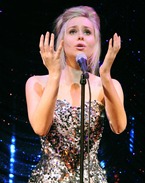SITE GUIDE
SEARCH
REVIEWS
REVIEW ARCHIVES
ADVERTISING AT CURTAINUP
FEATURES
NEWS
Etcetera and
Short Term Listings
LISTINGS
Broadway
Off-Broadway
NYC Restaurants
BOOKS and CDs
OTHER PLACES
Berkshires
London
California
New Jersey
DC
Connecticut
Philadelphia
Elsewhere
QUOTES
TKTS
PLAYWRIGHTS' ALBUMS
LETTERS TO EDITOR
FILM
LINKS
MISCELLANEOUS
Free Updates
Masthead
Writing for Us
A CurtainUp  London Review
London Review
 London Review
London ReviewThe Rise and Fall of Little Voice
|
Are you agoraphobic? Because if so, you can get out!— Mari
|

Diana Vickers as Little Voice (Photo: Alastair Muir) |
Vickers plays the reclusive girl who can sing like Shirley Bassey and Judy Garland but who doesn't speak. The play is as dark as you might expect with the cruel mother's unrelenting mistreatment of her shy and mostly silent daughter. The production sizzles, as full of sparks as the poor electrical wiring which causes many fuses to be blown in the course of the play in the upstairs, downstairs revolving set of the house in Scarborough, where Little Voice, as she is always called, lives with her mother Mari Hoff.
I found it very uncomfortable to watch Sharp's authentic performance as the raucous, drunken, promiscuous, vulgar woman, who to top it all is despicable to her daughter. While the mother brings home yet another man she has picked up, Little Voice retreats into her own world of old gramophone records left to her by her deceased father in her upstairs bedroom. When Mari has a telephone installed, a geeky phone engineer, Bill (James Cartwright, son of the playwright) takes a shine to LV and courts her from his lift platform which can reach up to her bedroom window from the street outside. During one of the many electricity power outages, one of Mari's men, Ray Say (Marc Warren) hears LV singing and is convinced that it is the radio such is the quality of her imitation. Ray thinks he can make money out of promoting LV and persuades Mr Boo (Tony Haygarth) to audition her with a view to a showing at his Working Men's Club.
In the club, LV, who says very little, looks as if she will not sing at all until Ray asks for the lights to be put out and for LV to pretend that her father is in the audience. She gives a perfect rendition of Marilyn Monroe's "My Heart Belongs to Daddy" and manages a thrilling medley of songs by Bassey, Garland, Piaf and Dusty Springfield.
The Rise and Fall of Little Voice is full of black humour. Lesley Sharp's mother is a conundrum because she has so many witty one liners yet she is absolutely dislikeable. It is a very brave performance from Sharp to be so unrelentingly despicable throughout. Marc Warren is excellent as the Flash Harry chancer and Tony Haygarth wearing Mr Boo's vain, bright red wig is laughable. Rachel Lumberg plays Sadie, Mari's plump friend and side kick. 18 year old Diana Vickers is very appealing as LV, the withdrawn little girl whose only form of expression is through the voice of great women singers. Her singing is captivating.
Don't read the next paragraph if you want the plot to grab you unexpectedly.
After one electrical fault too many, Mari's house burns down in a spectacular staging with flames licking up from the floor fuelled by all the alcohol Mari has stashed away. Mari destroys what are left of LV's records after Ray Say has explained that it is LV which kept him coming round, not romance with Mari. Finally as LV finds alternative expression, she sings in her own voice "Sunshine", specially composed for Diana by Mark Owen of Take That.
Lez Brotherston's set is remarkable, able to pivot to show both the outside pavement and the interior of the Hoff's house and full of detail and adapt to the scenes in the working men's club. Lighting and sound engineers give us the spit and hiss of realistic blown fuses and sudden darkness.
The play didn't take off on Broadway in 1994. It probably helps that I didn't see the 1992 play directed by Sam Mendes at the National Theatre and Terry Johnson's racy production has nothing to be compared with. Maybe it is peculiarly British but I found The Rise and Fall of Little Voice both interestingly comic and unusually engaging.
|
Subscribe to our FREE email updates with a note from editor Elyse Sommer about additions to the website -- with main page hot links to the latest features posted at our numerous locations. To subscribe,
E-mail: esommer@curtainup.comesommer@curtainup.com
put SUBSCRIBE CURTAINUP EMAIL UPDATE in the subject line and your full name and email address in the body of the message -- if you can spare a minute, tell us how you came to CurtainUp and from what part of the country. |
| The Rise and Fall of Little Voice
Written by Jim Cartwright Directed by Terry Johnson Starring: Lesley Sharp, Diana Vickers, Marc Warren With: Tony Haygarth, James Cartwright, Rachel Lumberg, Tim Parker Design: Lez Brotherston Lighting: Mark Henderson Music Supervisor: Nigel Lilley Sound: Ian Dickinson Composers: Ben and Mark Ringham Choreographer: Lynne Page Running time: Two and a half hours with one interval Box Office: 0844 412 4663 Booking to 30th January 2010 Reviewed by Lizzie Loveridge based on 21st October 2009 performance at the Vaudeville, The Strand, London WC2 (Rail/Tube: Charing Cross) |
|
REVIEW FEEDBACK Highlight one of the responses below and click "copy" or"CTRL+C"
Paste the highlighted text into the subject line (CTRL+ V): Feel free to add detailed comments in the body of the email . . . also the names and emails of any friends to whom you'd like us to forward a copy of this review. |
|
London Theatre Tickets Lion King Tickets Billy Elliot Tickets Mighty Boosh Tickets Mamma Mia Tickets We Will Rock You Tickets Theatre Tickets |




